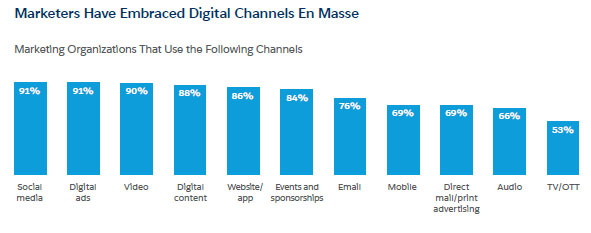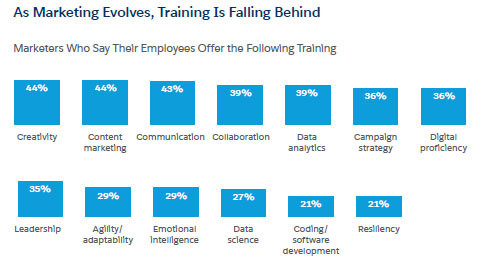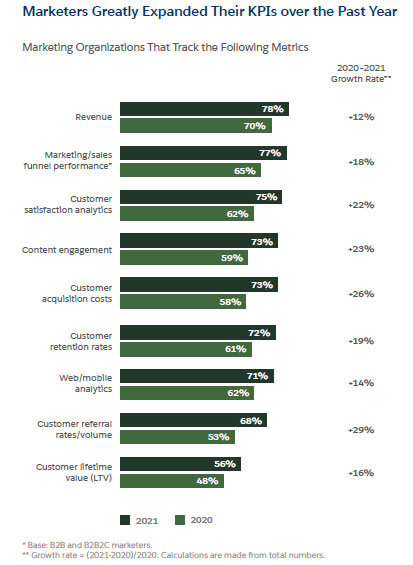
The team at Salesforce recently released their 7th annual State of Marketing research report. This eagerly awaited research covers the opinions of 8,200 global marketing leaders. The research is filled with interesting data and trends – and you can get a free copy from Salesforce at the link provided later in this post. And I will liberally share several of the tables from this fine report in this article.
The research highlights the increased optimism of marketers, how marketing has stepped up in many organizations to help drive digital transformation, the importance of data and business metrics and more. We put our marketing and agency leader hats on and pulled out the following five key takeaways for CMOs and agency leader.
The pace of digital marketing transformation increased dramatically since pre-Pandemic times. A quick look at the extent to which a broad array of marketing strategies have changed since before the Pandemic suggests an earthquake of change:

Source: Salesforce State of Marketing 7th Edition
What does this mean for CMOs and agency leaders? We recommend special, focused efforts on updating and optimizing integrated marketing workflows and processes. The number of strategy changes – digital engagement strategies, data strategies, channel mixes, content strategy, etc. – has been breathtaking. It’s a marketing “truth” that a strategy is only as good as its execution, and with so much change there undoubtedly is the need for new integrated processes that enable the organization to enjoy the benefits of the new strategies.
Organizations are recognizing the importance of a deep understanding of the customer journey, and how to impact that journey to improve marketing ROI. Customer engagement, creating a cohesive customer journey and improved marketing ROI and attribution are clearly among marketers’ top priorities:

Source: Salesforce State of Marketing 7th Edition
What does this mean for CMOs and agency leaders? CMOs should focus on ensuring that the right research is funded to ensure a sound understanding of their customer’s journey, and cross-functional/cross-channel teams should be charged with operationalizing this knowledge. Agency leaders have an opportunity to position their teams to help with this heavy lift by incorporating customer journey assessment, strategy development and tactical solutions into the agency’s offering. Agencies also have an opportunity to assist their clients with the brass tacks of marketing ROI and attribution.
The data driven marketing revolution is well underway but no where near its maturity. Data sources are multiplying every day, as shown by the Salesforce research:

Source: Salesforce State of Marketing 7th Edition
In addition, data transparency concerns abound. And very few organizations have adequate first party data or a data platform that enables them to adequately leverage that data.
For marketers, the investment in MarTech and talented strategists can’t be put off any longer. We’re happy to refer CMOs to outstanding consultants that have helped a number of corporations develop and implement the right transformation strategy and roadmap.
Agencies also can play a role here. Smart agencies can help clients bridge the gap between today and tomorrow with an agency data management solution that is transparent and readily transferable. And they can help advise clients in a platform agnostic manner during the transformation.
Modern marketers are using a myriad of digital channels and their teams need constant education. Over 50% of marketers are using 11 digital marketing channels:

Source: Salesforce State of Marketing 7th Edition
And yet – despite this increasingly complex environment, training continues to be a sore point in marketing organizations. Most key training is available in less than half of marketing organizations:

Source: Salesforce State of Marketing 7th Edition
What does this mean for CMOs? CMOs need to carve out the budgets needed to ensure their people are up to-date. They need to be trained up in new digital technologies. And they need the basics like training in strategy and insight development, briefing, workflow, creative evaluation and feedback delivery. Training in the basics appears to be a lost art in most major companies.
What does this mean for agency leaders? Agencies need to ensure that their teams are ahead of the curve regarding new marketing tools and technologies. Agencies have an opportunity to help their clients with these challenges on a day-to-day basis.
Finally, marketers today are more aligned with the C-suite and are focused on similar major company goals. The best CMOs of today are partnered at the hip with the heads of sales, finance and R&D; they translate the major goals of the company into customer experiences and marketing strategies that deliver on the company’s most important goals; and they ensure that their organization’s staffing and workflow are focused on these most important targets.
The Salesforce research showcases how marketing leaders are tracking a wide range of KPIs that the entire C-suite are typically aligned to support, like revenue, customer satisfaction, retention and LTV:

Source: Salesforce State of Marketing 7th Edition
If you are a marketer, you need to be sure that your organization has the necessary integrated marketing workflows needed to deliver these results and that your staffing s focused appropriately to deliver on these goals.
If you are an agency leader, you need to help you marketing partners by showcasing just how marketing investments can advance the goals of the C-suite and ensure that the agency’s efforts are focused on solutions that align with these goals.
The Salesforce State of Marketing report is a fine resource that every marketing and agency leader should read. You can access it here for free from the Salesforce team: State of Marketing in 2021: 78% Report New or Reprioritized Metrics – Salesforce News
And – if you have questions about any of this – we’d be happy to speak with you. We have helped numerous marketers and agencies transform their capabilities including modernizing agency rosters, enhancing marketing workflows and briefing processes and training strategy, creative evaluation and feedback processes.
Steve Boehler, founder, and partner at Mercer Island Group has led consulting teams on behalf of clients as diverse as Zillow Group, Microsoft, UScellular, Nintendo, Ulta Beauty, Stop & Shop, Qualcomm, Brooks Running, and numerous others. He founded MIG after serving as a division president in a Fortune 100 when he was only 32. Earlier in his career, Steve Boehler cut his teeth with a decade in Brand Management at Procter & Gamble, leading brands like Tide, Pringles, and Jif.